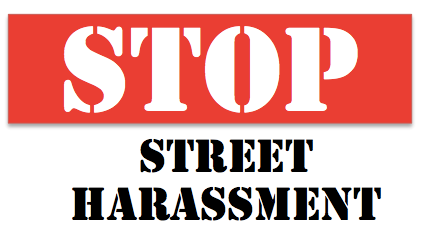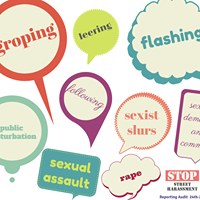The Bristol Street Harassment Project
- SheCurates
- Nov 16, 2018
- 4 min read
Our cities’ streets are not safe for women. We think back to our experience as young schoolgirls and recall an afternoon spent listening to a ‘safety’ talk given by a local police officer. Sitting side by side on old wooden benches, elbow-to-elbow with our female peers, we listened as we were told the stories of those women who had 'failed' to adequately protect themselves from men. We learnt therefore that the onus was on us: it was our job to avoid meeting the same fates. And so we carried this officer’s lessons with us through life, assuming them as armour: always walk home along streets that are well lit; hug the pavement furthest from the road to make the possibility of being bundled into a car more difficult; hold our keys in our hand so they might become a weapon; cross the street away from a man who may be following us home.
There is no doubt that navigating the urban world is an entirely different experience for a woman than it is for a man. In fact 65% of all women have experienced street harassment – in some surveys this figure rises to as high as 99%. These experiences form a continuum for women ranging from verbal harassment, sexual harassment, unwelcome sexual touching and being physically followed. Whatever path we tread as women – whether we have experienced harassment or not – we exist in a state of heightened awareness. We bend, adjust and pivot our daily lives around the axis of potential threats (whether knowingly or not).
But this is an issue that one UK city – the City of Bristol - is taking into her own hands. Thanks to an initiative being managed by Bristol Women’s Voice, a local charity that works to find ways to support and empower women in enacting change, Bristol may soon be a city whose streets are safe for women. Bristol Zero Tolerance came from the Bristol Women’s Commission Safety Task Group and a recommendation made following a local Domestic Homicide Review, for businesses to have an awareness of gender-based violence issues in order to provide support and raise awareness in the wider community about its impact. It also drew on a similar Zero Tolerance project in Scotland, which has been established for a number of years. The idea was to create a citywide preventative approach to all forms of gender-based violence, abuse, harassment and exploitation. The work of Bristol Zero Tolerance led to Avon and Somerset Police introducing the new gender/misogyny hate crime category in October 2017 during National Hate Crime Awareness Week.
One year on and gender is the second highest reported hate crime category locally.
The Bristol Street Harassment Project is a campaign launched during International Anti-Street Harassment Week in April 2018. It forms part of the Bristol Zero Tolerance initiative and came from local women raising the issue of street harassment as a particular problem in Bristol. The initiative was therefore prompted to carry out a local survey with over 100 (predominantly female) respondents. This #snapshotofharassment showed that 35% experienced harassment daily, 98% of harassers were male and 81% had not made a report to the police. Following analysis of the data gathered on harassment, a set of comprehensive plans was drawn up to tackle the issue.
Bristol Zero Tolerance was awarded funding from the Avon and Somerset Police and Crime Commissioner in 2018, which they are now using to help put The Bristol Street Harassment Project plans into action. For example, they have launched Street Harassment Toolkits that help victims of harassment report their experiences to the police, educate others on how to become ‘Active Bystanders’ and even offer creative solutions on how victims can tackle harassment (if they feel safe and confident enough to do so). The initiative also feeds into work in parks and green spaces, working with transport companies to address harassment on public transport as well as local ‘night time businesses’ to address sexual harassment in Bristol’s local bars, clubs, pubs etc. As part of the project an Online Mapping tool has also been created, allowing victims of harassment to locate their experience on an interactive map of the city. In turn this creates a picture of what street harassment looks like in Bristol, allowing the project to identify key areas that would benefit from targeted intervention.
The people who live in Bristol - or ‘Bristolians’ - are proud that their city’s identity is characterised by innovation. It has developed a reputation for being a progressive city, not afraid to be ahead of the curve. In fact children's charity Plan International UK recently launched their report on girls' experiences of street harassment in the UK and included the work of The Bristol Street Harassment Project. However Bristol also includes some of the most deprived areas in the UK and has huge (often unseen) disparities in equality across the city. In this way, it can also feel like a city of extremes. For Bristol Zero Tolerance and Bristol Women’s Voice, working on street harassment is part of addressing gender-based violence as a citywide issue. Their mission is to change the attitudes and behaviours that normalise and condone all forms of gender-based violence. They are focused on mobilising a community response, in particular looking at how bystanders (including men and boys) can step in to provide support and challenge these behaviours.
We hope, along with Bristol Women’s Voice, that initiatives and campaigns such as Bristol Zero Tolerance and The Bristol Street Harassment Project can empower people to mobilise change at the grassroots and community level.
Our cities’ streets must become safe spaces for women as well as men - free from the threat of violence and harassment. But it is time to remove the armour we have been wearing for far too long and shrug off the weight of responsibility.
The lessons we teach our girls and young women should not be about prevention.
Instead, it is up to ALL of us to be working towards a cure.
You can find resources and all the toolkits from The Bristol Street Harassment Project here: http://www.bristolzerotolerance.com/take-action/take-action-as-an-individual/.
You can also stay up to date with their work and what is happening with street harassment at a national and international level through their Facebook page https://www.facebook.com/BristolStreetHarassmentProject.
SheCurates.











Comments